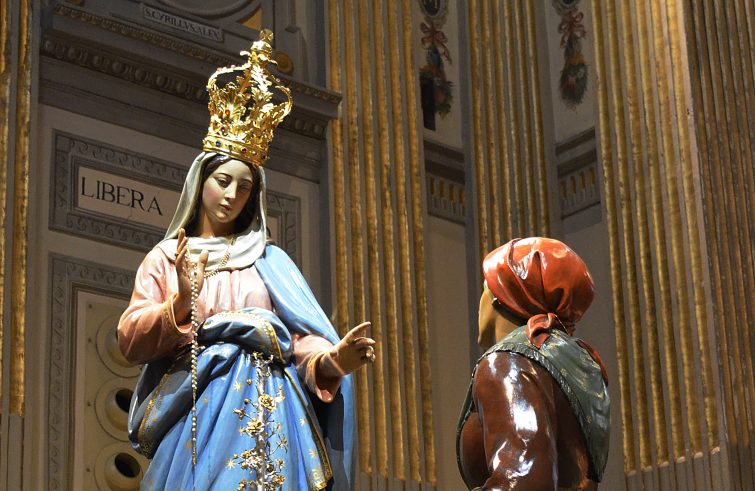
An opportunity “to rebuild the country” after the coronavirus and to “be united as a people” overcoming controversy and seeking what unites us. Father Gianmatteo Roggio, Counselor of the Pontifical Academia Mariana Internationalis (PAMI), contacted by SIR, delved into the significance of entrusting Italy to Mary, promoted by the Italian Bishops’ Conference at the Shrine of Our Lady of Caravaggio on 1 May, which is an “official act”, as well as a prayer. “It regards not only the faith community but also the different ways of being citizens,” he pointed out. In Europe, as in Italy, in times of pandemic, Marian shrines engage in initiatives of prayer, health care and evangelization online.
What is the significance of entrusting Italy to Mary in times of coronavirus?
On May 1, Italy’s entrustment to Mary’s immaculate heart, celebrated for the first time in 1954 by the Church and the Italian people, will be renewed. “Renewal” means that we renew our intention to look up at Mary for the qualities, values and attitudes required.
to restart, to rebuild the country in a fairer, more equitable way, with increased consideration for the dignity of each and every person.
The act of entrustment is in fact an act of prayer by virtue of which we entrust ourselves to Mary’s motherly love, whereby we discover that we are not distant from God and that God does not abandon us. However, this gesture incorporates a deep educational dimension: Mary loves us and guides us; she offers us a vision of life which guarantees to everyone the defence of the dignity of the human person and of life.
The initiative of 1 May will take place just over a month after the Pope’s entrustment to Mary in an empty St. Peter’s Square. Are these two events connected?
They certainly are. The event of May 1st is somewhat a continuation of the event of March 27th. “We are on the same boat,” Pope Francis told us on that occasion. The May 1st initiative tells us “who” is stepping into the boat, who is standing behind “everyone.” In Mary’s motherly and immaculate heart, ” everyone” is truly synonymous with “everyone”: not just someone, but everyone indeed. It’s a tremendous challenge. Each one generally tends to tilt the balance in their own favour, by contrast, implicit in “everyone” invoked by Pope Francis is a request:
“Woe betide me if a leave someone out.” Even when life will get back to normal, many people and many situations could be excluded, let it to suffice to mention the debate on the elderly.
For “everyone” to be truly on the same boat means fighting the “throwaway culture”, which the Holy Father has denounced since the start of his pontificate.
Are there special initiatives underway in the various European shrines, in this time of pandemic?
There are many initiatives linked to the three aspects of prayer, healthcare and evangelization. Those shrines equipped with technical infrastructure designed to support the new media have ensured the continuation of prayer. Some, such as the Shrine of Our Lady of La Salette, in France, have offered to host quarantined people. Other shrines likewise complied with government regulations for the health emergency, and adjusted according to the regulations of each country. For the great pilgrimage in May, the shrine of Fatima has been equipped with technological systems so as to ensure the traditional experience of the pilgrimage also via new digital platforms. In addition, all the shrines offer initiatives of evangelization online, such as prayers, meetings, catechesis.
On May 1st we will for Italy to be a united country. This hope is also in keeping with the message of the Marian apparitions that characterize the history and traditions of many shrines.
The Marian apparitions often express the message of “coming together as a people”, a theme very dear also to Pope Francis.
To “act in unison, as a people”, means being able to overcome controversy and seek the real goodness that unites everyone. It means: let’s stop focusing on what divides and tears us apart to rediscover what unites us instead.
The faith community is united through Jesus. For non-believers the unifying factors are values, the cultural heritage of a people, of a nation. As the Pope says, the deep identity of a people is always linked to the “culture of encounter”, a welcoming people, that opens doors, builds bridges, excludes no one. A people with the courage to grow in hope by defending and promoting the dignity of everyone, everywhere.
Italy is preparing for “phase two” of the coronavirus emergency, which has already started in other countries. Can the conversion of hearts, called for by the Holy Virgin in each of her messages, effectively help us to change course?
Indeed, because no one like Mary revives the message that
we must not look back to the past but know how to build the future.
We are experiencing a period of great difficulty. We were happy with the world as it was before, we were happy with the way things were, but maybe this pandemic has made us realize that we can’t continue this way in the future. Of course, our past was full of good things, but maybe all that glittered was not gold. We need to build a different future, where wealth is our shared dignity and the mutual service we can render – both as believers and as citizens.
Entrustment to Mary is also a public act, that extends not only to the faith community but also involves different ways of being citizens
And for a Christian believer, citizenship is about knowing how to serve and being committed for the life and dignity of all.









